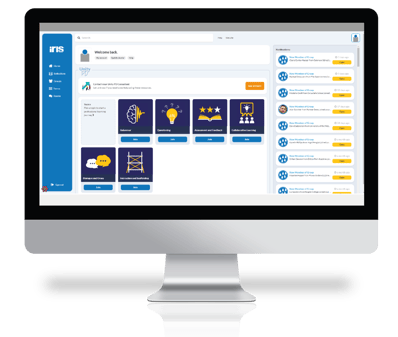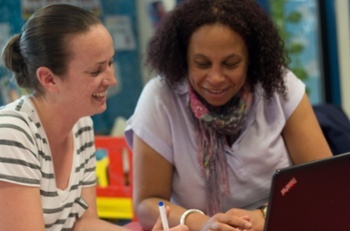 Coaching in education is more than just questioning. It is a powerful approach to supporting and developing effective teaching practices. Through coaching, teachers receive personalised support, feedback, and guidance that can enhance their professional development and improve student outcomes.
Coaching in education is more than just questioning. It is a powerful approach to supporting and developing effective teaching practices. Through coaching, teachers receive personalised support, feedback, and guidance that can enhance their professional development and improve student outcomes.
Coaching provides teachers with opportunities to reflect on their teaching practices, identify areas for improvement, and develop new skills and strategies to enhance their teaching effectiveness.
We have spoken to a number of experienced teachers about the best tools focused on increasing the effectiveness of coaching in schools, and have compiled a list of the 11 best.
11 tools you can use to make the most of coaching sessions
1. Rapport building
With increasing workloads, rapport building can be easily dismissed as time wasting chit chat. However for meaningful conversations that result in change, we need to connect with colleagues we are coaching and this means more than a cursory, ‘how was the break?’. You could try to expand on questions like these and build more dialogue. For example:
What did you do over the holidays?
Not much, just a trip to the theatre.
What did you see? Were you with family?
2. Modeling
Modeling is a coaching technique that involves demonstrating a new skill or technique for the teacher to observe and then attempt to replicate. Coaches can demonstrate the new skill or technique through the use of video which has many benefits:
Flexibility
Video allows the coach to record and review the demonstration at a time that is convenient for both the coach and the teacher. This can be particularly helpful in situations where the coach and teacher are not able to meet in person or have conflicting schedules.
Repeatability
Video allows the teacher to watch the demonstration as many times as they need to fully understand the skill or technique being demonstrated. This is particularly helpful for more complex skills or techniques that may require multiple viewings for the teacher to fully grasp.
Focus
Modeling via video allows the coach and teacher to focus on specific aspects of the demonstration, such as body language, tone of voice, or pacing. This can be particularly helpful in situations where the coach wants to highlight specific elements of the skill or technique being demonstrated.
Objectivity
Video provides an objective record of the demonstration, allowing both the coach and teacher to review the demonstration without the influence of personal biases or subjective interpretations. You can also watch the lesson through the lens of a student, putting yourself in their shoes to get a better understanding of the success or failure of certain teaching techniques.
3. Observation
Observing teachers is a powerful coaching tool. Observing a lesson provides a firsthand view of a teacher's classroom practice and can provide coaches with insight into what teachers are doing well and where they may need support. It can help teachers to identify their strengths and areas for improvement, set goals, and develop new strategies to improve their teaching.
Our Lesson Observation blog focuses on ways to support great teaching using lesson observation.
4. Scaling
Scaling encapsulates the idea of change and progress very easily. By pinpointing a position on a numerical scale, our attitude or feelings towards the most complex, messy situation can be quantified and steps forward can be made. If necessary, simply sketch out a scale. For example:
On a scale of 1-10, how happy are you with boys’ engagement in this class at the moment?
It is about a 3.
What is happening in a class where it is 8?
5. Reflection
Reflection can be a powerful coaching tool for teachers because it allows them to develop a deeper understanding of their teaching and learning practices, identify areas for improvement, and develop an action plan for making changes. By engaging in reflective practices with the support of a coach, teachers can improve their effectiveness in the classroom and support student learning and success. Reflecting on ones practice is important
Want to know how to encourage reflective teaching in your school? View the Ultimate Guide to Reflective Practice in Teaching.
6. Minute by minute contracting
Initial coaching training in education emphasises that coaching is not about providing solutions. As a result, we can be nervous about sharing our expertise, but our expertise could be helpful for the coachee. Minute by minute contracting involves seeking permission from the coachee for you to offer your own experience or knowledge. For example:
Would it be helpful if I shared what I did with some boys in a similar ability group last year?
Yes- that would be great actually. I am not sure where to start really.
Well, it took a while, but I figured it was the start of lessons that were key, so I changed my starters. I made them shorter and more competitive.
7. Questioning
Questioning helps coachees develop their critical thinking skills, improve their understanding of a topic, and clarify their thought processes. Through questioning, a coach can guide teachers to reflect on their teaching practices, identify areas for improvement, and develop a deeper understanding of the content being taught. Coaches can use a variety of questioning techniques that can help teachers think reflectively about their practice. For example:
Open-Ended Questions
Using open-ended questions encourage teachers to think deeply and reflectively about their teaching practices. Open-ended questions can help the teacher identify areas for improvement and develop a deeper understanding of the content being taught.
Using ‘what’, ‘if’ or ‘how’ is a great way to start with open questioning as these questions cannot be answered with a simple 'yes' or 'no'.
Probing Questions
Probing questions encourages teachers to elaborate on their responses and provide more detail. For example, 'why do you think that is?' or 'what might be the result of this then?'.
Hypothetical Questions
Hypothetical questions are a great tool for getting teachers to consider alternative approaches to their teaching practice. For example, 'If this behaviour continued in the lesson, how would you change your strategy?'.
8. Silence
As teachers, we have to focus on wait time and as teacher coaches, we have to be comfortable with that same silence and thinking space. Simply allowing someone time to process and reflect in the coaching conversation can be transformational, but we need to develop the habit. Even if this seems at odds with our profession; one that is so synonymous with talk.
9. Goal Setting
Setting goals can help teachers focus their efforts and track their progress. A coach can work with the teacher to set goals that align with the teacher's professional development needs and the needs of their students. Setting SMART goals can:
Identify Professional Development Needs: The coach can work with the teacher to identify areas for improvement in their teaching practices or content knowledge, and then set goals that align with these needs.
Focus on Student Outcomes: The coach and teacher can set goals that focus on improving student outcomes, such as increasing student engagement, improving student achievement, or reducing achievement gaps.
Establish Accountability: Setting goals helps establish accountability and provide a framework for assessing progress. The coach can help the teacher establish a plan for tracking progress toward the goals and provide feedback and guidance to help the teacher stay on track.
Align with School or MAT Goals: Setting goals that align with school or MAT goals can help teachers see the connection between their individual efforts and the broader goals of the school or MAT.
Celebrate Success: When teachers achieve their goals, it is important to celebrate their success and recognize their accomplishments. Celebrating success can help motivate teachers to continue their professional development efforts and set new, more ambitious goals.
10. Compliment giving
Many of us are uncomfortable with compliment giving as it can appear manipulative or driven by agenda. How many times have we entered someone else’s classroom and admired a display, but not said anything. How many times have we listened to someone and admired how determined they are or hard they are working? Compliment giving in coaching or even our daily conversations isn't about finding something nice to say; it's about acknowledging thought, work and success in a precise way. If someone feels a little bit better in their day as a result, then we are all winning! For example:
I really liked what you said about friendship in the assembly this morning. Some of the students over by me looked really surprised!
That key word challenge starter you shared really engaged 9Y4, they all got at least 6 words in! Some achieved 10. Thank you.
11. Video Analysis
 Using video to record lessons allows teachers to easily capture and review an objective record of their teaching and learning. A tool like IRIS Connect gives each teacher an private online space where lessons can be uploaded, edited and optionally shared. Colleagues and coaches can comment on these reflections using time-stamped notes and analytical tools can be used to measure progress over time.
Using video to record lessons allows teachers to easily capture and review an objective record of their teaching and learning. A tool like IRIS Connect gives each teacher an private online space where lessons can be uploaded, edited and optionally shared. Colleagues and coaches can comment on these reflections using time-stamped notes and analytical tools can be used to measure progress over time.
The release of UnityPD has brought together everything the research shows is needed to bridge the gap between theory and classroom practice. Specifically, theory modules and research behind important teaching strategies alongside video exemplifications of real teachers modelling these strategies in real classrooms. As well as personalised coaching pathways that provide step-by-step guidance to implement the learning in classrooms.
Meet with us to get a demo of IRIS Connect and UnityPD.
Do you have any coaching tips to share? We'd love to hear from you in the comments section.




Leave a comment:
Get blog notifications
Keep up to date with our latest professional learning blogs.